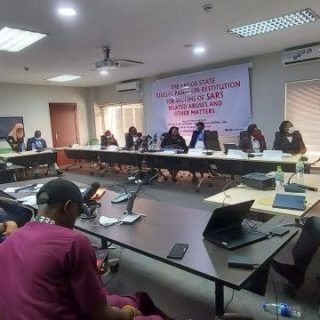Citizen is a column that explains how the government’s policies fucks citizens and how we can unfuck ourselves.
Did you know that 16,925 sought asylum from Nigeria to Europe in 2019 alone, making Nigeria the country with the 8th most asylum seekers to Europe?
After news broke that DJ Switch, the disc jockey who filmed shootings at the #LekkiMassacre and shared live on Instagram, had been granted asylum to Canada, we decided to explain the right of asylum and the asylum process.
Read: 7 Times Nigeria Has Killed Peaceful Protesters
What Is The Right of Asylum?
The right of asylum is an ancient judicial right in which a person that is persecuted by their own country may be protected by another authority, such as a church or a country. This right was recognised by Egyptians, Greeks and Hebrews before it was adopted into modern tradition.
If a person in Nigeria is being harrassed, violated or persecuted because of their race, nationality, sexual orientation, political opinion or tribe, they can seek asylum to another country.
How Do Modern Political Asylums Work?
Article 14 of the Universal Declaration of Human Rights states that “everyone has the right to seek and to enjoy in other countries asylum from persecution”.
The United Nations 1951 Convention Relating to the Status of Refugees and the 1961 Protocol Relating to the Status of Refugees guides national legislation concerning political asylum.
Under these agreements, a refugee is a person who is outside that person’s own country because of fear of persecution on “protected grounds”.
Since the 1990s, victims of sexual persecution on the basis of their domestic sexual violence or their sexual orientation have been protected in other countries, if the person can prove that their country does not protect them.
Asylum Laws In Different Countries:
Different countries in the world have laws regulating asylums.
1. France
In France, the right of asylum is guaranteed under the 1958 constitution. This constitution draws from France’s 1946 and 1783 constitution which guaranteed the right of asylum to “anyone persecuted because of his action for freedom”, and who is unable to seek protection in his own country.
France also follows international agreements on the right of asylum such as the 1951 United Nations Convention Relating to the Status of Refugees.
2. United States
The United States recognises the right of asylum of individuals as specified by international and federal law.
Since 1980, over 2 million refugees have arrived in the United States.
3. European Union
The European Union welcomes asylum seekers, known as asylees.
However, the Dublin convention of 1990, the Eurodac regulation and the Dublin regulation of 2003 regulate how member countries of the European Union can take in asylum seekers.
Read: We Asked 7 Nigerians The Worst Parts About Living Abroad
Asylum Process To Canada
Asylum processes are different from country to country. This is how an asylum process to Canada works:
- Canada’s Immigration and Refugee Protection Act requires that every person seeking to enter Canada must appear for an examination at a port of entry to determine whether the person has a right to enter Canada or may become authorised to enter and remain in Canada.
- A port of entry is a place where a person can lawfully enter a country. It can be an airport, a seaport or a land border.
- Individuals can make an asylum claim in Canada at a port of entry or at an office of the Canada Border Services Agency (CBSA) or at the Immigration, Refugees and Citizenship Canada (IRCC) office. CBSA or IRCC officials will determine if an individual is eligible to make a claim.
- Factors determining an individual’s eligibility to make a refugee claim include whether the claimant has committed a serious crime made a previous claim in Canada or received protection in another country.
- All eligible refugee claimants receive a fair hearing at the Immigration and Refugee Board of Canada (IRB), an independent tribunal. Each case is decided on its merits, based on the evidence and arguments presented.
- In making its decisions, the IRB considers whether the claimant meets the United Nations (UN) definition of a convention refugee, which has been adopted into Canadian law or is a person in need of protection.
- The UN defines Convention refugees as people who have a well-founded fear of persecution based on race, religion, political opinion, nationality or membership in a particular social group.
- Under Canada’s Immigration and Refugee Protection Act, a person in need of protection is a person in Canada who would be subjected personally to a danger of torture, a risk to their life or a risk of cruel and unusual treatment or punishment if they were returned to their home country.
A lot of Nigerians seek asylum yearly, and this is worrying, as it shows that a high level of injustice is being done to many Nigerians on the basis of their religion, tribe, political opinion or sexual orientation.
Nigeria must work harder at becoming a safer country for everyone.
We hope you’ve learned a thing or two about how to unfuck yourself when the Nigerian government moves mad. Check back every weekday for more Zikoko Citizen explainers.
COMPONENT NOT FOUND: donation




